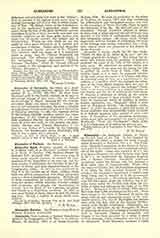

Alexander Sauli, BLESSED, Apostle of Corsica, b. at Milan, 1533, of an illustrious Lombard family; d. at Pavia, October 11, 1592; declared Blessed by Benedict XIV, April 23, 1742. After some years of study under capable masters, he entered the Congregation of the Barnabites at an early age, and became teacher of philosophy and theology at the University of Pavia, and later Superior-General of the Congregation (1565). In 1571 he was appointed by Pius V to the ancient see of Aleria, Corsica, where faith was all but extinguished, and clergy and people were in a state of deplorable ignorance. With the aid of three companions, he reclaimed the inhabitants, corrected abuses, rebuilt churches, founded colleges and seminaries, and despite the depredations of corsairs, and the death of his comrades, he placed the Church in a flourishing condition. In 1591 he was made Bishop of Pavia, where he died the following year. He left a number of works chiefly catechetical.
F. M. RUDGE

